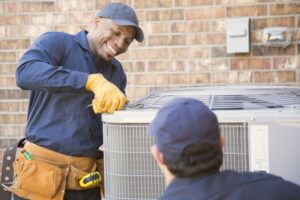
When you live somewhere as hot as Houston, and you’ve searched for information about AC installation at the beginning of August, that tells a story. You are probably in very big need of a new air conditioner, now.
We completely understand the sense of urgency; however, rushing into an AC purchase is never a good idea, as it can leave you with a system that’s improperly matched for your specific home and needs. It might not even be sized correctly for your space. That’s why it’s crucial to select the right AC size to ensure optimal cooling and efficiency. A Manual J load calculation should be performed to ensure the system is correctly sized for your home, avoiding issues like inefficiency or inadequate cooling.
And then, when it comes to the actual installation job, there are a number of steps that make the installation flawless. If any steps are missed or done incorrectly, it can lead to problems like short-cycling and refrigerant leaks, refrigerant leaks, ductwork damage, and other efficiency problems. It could even lead to a premature system breakdown.
Ultimately, air conditioning systems are very complex and they require a trained and experienced professional to install them. By law, HVAC contractors in Texas must be licensed by the Texas Department of Licensing and Regulation, ensuring they meet the necessary standards for safety and quality.
Read on as we uncover the three main steps of AC installation, and why it’s so important to leave this job to the trained and experienced techs on our team. Choosing a licensed and insured HVAC contractor is crucial for heating replacement projects in Houston to ensure the job is done safely and effectively.
What makes professional heating and air conditioning installation essential?
- Technicians properly remove and recycle old AC units, avoiding environmental harm from refrigerant release. Experts size and configure ductwork, wiring, and refrigerant lines to ensure optimal performance and energy efficiency.
- Professional installers perform comprehensive testing after setup to verify the system operates as designed, preventing issues like short‑cycling, leaks, and premature breakdowns. Testing and calibration of a new HVAC system is necessary to ensure it operates safely and efficiently after installation.
Step 1: Removing and Disposing of Your Old AC Unit
Well, that sounds simple enough, you might be thinking.
Actually, taking out the old system can be the most laborious part of the AC installation process!
This is because your older air conditioner has a number of components that need to be properly disposed of to remain safe, and also we have to make sure to not disrupt any connections we’re going to need later. You should replace your furnace if you’ve had it for 15 years and it’s beginning to need frequent repairs. Most furnaces have a lifespan of 20–30 years, so planning for replacement within this timeframe can help avoid unexpected breakdowns.
Take refrigerant, for instance. In older air conditioners, R-22 has been the refrigerant of choice. It has since been phased out because it’s not good for the environment. So naturally, this isn’t something we want to leak out due to improper removal of your old system. If you’re unsure whether your system is due for replacement, now might be the best time to consider preparing for professional installation to avoid future issues.
Regarding the connections, we’re talking about things like the ductwork. It’s actually quite easy to damage the ductwork when removing an old air conditioner if you’re not careful. Assessing the condition of existing ductwork or infrastructure is important, as it can impact the installation process and overall costs.
Step 2: Properly Connecting Ducts, Wiring & Refrigerant Lines
Once the new system is placed where it needs to be, our technicians will connect it to that ductwork we just mentioned.
There are times when need to shift around the ductwork a bit, and maybe even move wiring around, to get your new air conditioner in place. Our experienced professionals know how to do this without damaging any components in the meantime. The same goes for the electrical and refrigerant line connections needed for your air conditioner to function. Electricity powers the system and is essential for its operation, ensuring all components work efficiently together.
Step 3: Testing AC Performance and Ensuring Optimal Operation
This is the most important step of a successful air conditioning installation! After all, what good is installing a new home comfort system if we don’t actually ensure that it works as it is supposed to?
If we did that, you wouldn’t know what to expect–you’d have no way of knowing if your system is working as efficiently as it’s meant to, or if any sounds it’s making are abnormal. Pay close attention to unusual noises such as knocking, popping, or screeching, as these can indicate serious issues that require professional attention. To avoid surprises down the road, you should also understand what happens during AC maintenance and how regular checkups support long-term system health. It’s recommended to request and compare quotes from at least three HVAC companies to understand fair pricing. Programmable thermostats can help save energy and lower bills by allowing you to set schedules that match your daily routine. If not for any other reason, the best reason to hire a professional for your air conditioning installation service is so you can make sure the system operates exactly as it’s meant to. When it comes to choosing the right person for the job, be sure to select the best AC installer to guarantee quality workmanship.
Consequences of Improper Installation
When it comes to your home heating system, how it’s installed is just as important as the equipment you choose. Improper installation of a heat pump, natural gas furnace, oil furnace, or boiler can lead to a host of problems that impact your comfort, safety, and wallet. Houston’s climate features mild winters and hot, humid summers, making proper installation and system selection even more critical for year-round comfort. In Houston, proper sizing of cooling systems is critical to avoid issues like mold and mildew, which can arise from oversized or undersized units.
A poorly installed heat pump system may struggle to deliver heated air evenly throughout your house, resulting in uneven heating and cold spots in certain rooms. This not only makes your home less comfortable during winter, but also forces your heating equipment to work harder, driving up energy bills and leading to frequent repairs. Similarly, an incorrectly installed natural gas furnace can create serious safety hazards, including the risk of carbon monoxide leaks—a silent, potentially deadly threat to your family.
Beyond safety, improper installation can drastically reduce the energy efficiency of your heating system. If your new furnace or boiler isn’t set up correctly, it may waste energy, causing higher costs for both heating and cooling as your system struggles to maintain the desired temperature. Over time, this inefficiency can lead to a higher cost of ownership, as you’ll face increased maintenance, costly repairs, and even premature replacement of your equipment.
Frequently Asked Questions
Question: Why is professional AC installation crucial?
Answer: Professional installation ensures the system is sized correctly, safely installed, and calibrated for optimal performance. This reduces energy waste, prevents breakdowns, and keeps manufacturer warranties valid. Proper installation is especially important for different types of heating systems, including furnaces, boilers, electric furnace, and heat pumps, as the type of fuel—such as natural gas, propane, or electric power—impacts efficiency, costs, and safety.
Question: How does professional installation improve energy efficiency?
Answer: Pros perform precise load calculations and install components like refrigerant lines and ductwork with exacting standards, helping units run more efficiently and lower monthly utility bills. Upgrading to high efficiency and energy efficient systems, such as heat pumps, high-efficiency furnaces, and boilers, as well as upgrading insulation and ductwork, can further reduce both heating and cooling costs.
Question: What risks come with DIY or poor-quality AC installation?
Answer: Incorrect installation can lead to short cycling, refrigerant leaks, airflow issues, electrical hazards, voided warranties, and premature system failure. There is also a risk of corrosion, dust buildup, and unusual noises, which can indicate problems with burners, heat exchangers, or ductwork.
Question: In what ways does professional installation extend system lifespan?
Answer: Proper setup of components like ductwork, wiring, and refrigerants minimizes mechanical wear, reduces repairs, and extends system longevity. Upgrades and upgrading, such as improving insulation, sealing ducts, and retrofitting existing systems, can further enhance efficiency and HVAC system’s longevity. ENERGY STAR qualified units can save up to 20% on heating and cooling costs, making them a smart choice for long-term savings.
Question: Why should I choose a professional installer for post-installation support?
Answer: Professionals offer ongoing maintenance plans, system inspections, and support services, ensuring peak efficiency, compliance, and addressing issues before they escalate. They can also help homeowners with system upgrades, advice on when to consider replacing or upgrading to new systems like a new boiler, radiant floor systems, or geothermal solutions.
Question: How long do heating and cooling systems typically last?
Answer: The typical service life of most furnaces and boilers is about 15–30 years, while heat pumps and air conditioners may last 10–15 years. It’s important to plan to replace these systems before the end of their life to avoid frequent repairs and unexpected breakdowns.
Question: Should I repair or replace my old system?
Answer: Frequent repair costs can add up over time, draining your money. Investing in upgrades or replacing old units with high efficiency models can save money in the long run through lower energy bills and reduced maintenance. Upgrading to energy efficient systems is often the best bet for long-term savings and comfort.
Question: What types of heating and cooling systems are available?
Answer: There are many options, including furnaces (natural gas furnaces, propane, electric furnace), boilers (hot water and steam), heat pumps (including geothermal), radiant floor heating, and electric wall heaters. Each uses different fuels and technologies—some use power from electricity, others burn fuel like natural gas or propane, and heat pumps extract heat from outside air. High-efficiency heat pumps provide both heating and cooling and operate efficiently in mild climates, making them a versatile option for many homes. Heat pumps are the smartest and most efficient home heating option available today, offering significant energy savings and environmental benefits.
Question: How does energy efficiency affect my costs?
Answer: Energy efficient and high efficiency systems use less energy to provide the same comfort, lowering both heating and cooling costs. Upgrades like improved insulation, air sealing, and efficient HVAC equipment can significantly reduce your utility bills.
Question: What should I consider when installing or replacing a system?
Answer: Consider your existing infrastructure, such as duct system, insulation, and floor compatibility for radiant floor systems, when upgrading or replacing heating equipment. The type of system, fuel source, and available upgrades all impact efficiency, comfort, and long-term costs.
For professional AC Heating in Houston look no further than Cool Care Heating and Air Conditioning. Contact us today for “The Best Care for Your Air!”


